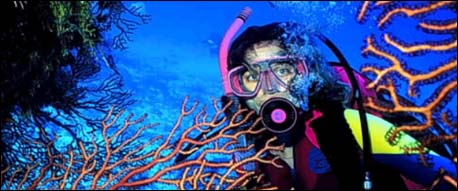
SPONSORED
LINKS
Diving Rules
To Display Proper Dive Flags & Marker Buoy
-
All divers diving in a body of water with the aid of any breathing device or suit should be used either the nationally recognized diver's flag or an Anchored Marker Buoy to indicate the presence of a diver below.
(Diver's Down Flag - a square, red flag not less than twenty inches by
twenty-four inches (24 X 20) with a four inch white diagonal stripe from one top corner to the opposite bottom corner; Alpha flag - A rigid replica of the
International Code "A" flag not less than one meter in height may also be used to indicate a submerged
diver).
-
When flown from a vessel, the flag should be flown not less than one (1) meter above the highest point of the vessel, and shall be in the extended position so as to be visible to any other vessel at least a three-hundred-sixty-degree circle.
-
A scuba diver shall dive and surface in close proximity to the flag.
-
No person shall place a diver's flag on the waters unless diving activity is in progress in that area.
-
If a diver's flag is placed after sunset or before sunrise, it shall be lighted.
-
The operator of any vessel shall not approach within 150 feet of a posted diver's flag, unless the vessel is part of the equipment in use by the divers.
A Word Of Caution
-
No person shall dive in any waters unless he holds a valid certificate from an accredited scuba diving school or is in the company of a certified scuba diving instructor.
-
No scuba diver shall dive in a congested boating or fishing area such as narrow channels, launching or docking areas, or near reservoir outlets.
To explore the beautiful, and often mysterious, underwater world is like no other experience on earth. But with this privilege comes the responsibility to keep this unique environment as undamaged by human activity.
Diver's Responsibility
Do not break plants or coral or collecting a piece as "souvenirs." Remember that even the lightest touch with hands or equipment can damage sensitive coral polyps.
Resist the temptation to feed fish, seabirds and marine mammals; it changes their natural behavior and diet.
Dumping trash at sea is illegal; plastic bags and other debris can injure or kill marine animals. Sets a good example of environmental responsibility and Bring your trash back to shore and recycle it.
(Please check with the appropriate governing agencies for current diving and boating rules.)
OTHER PAGES
8

|